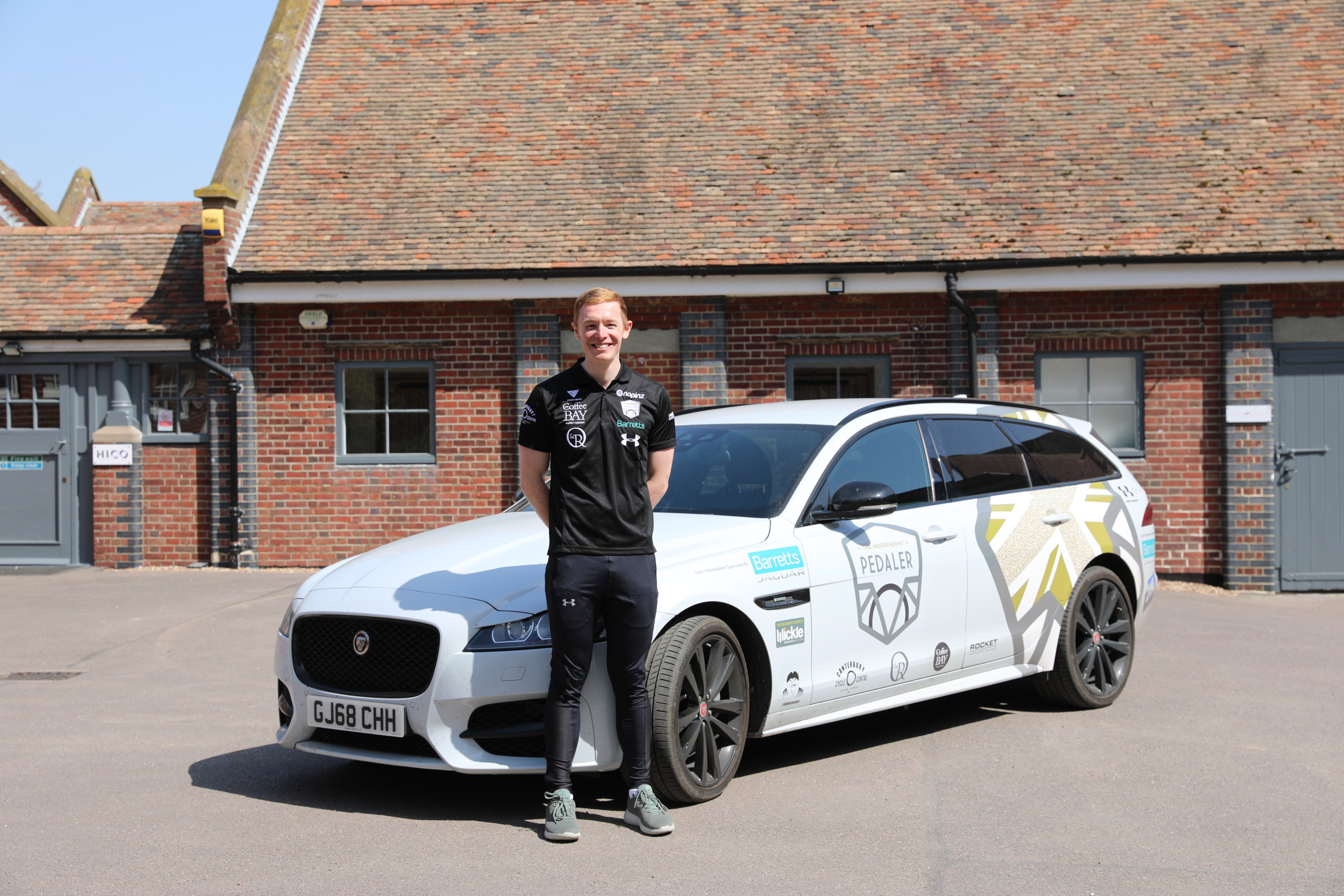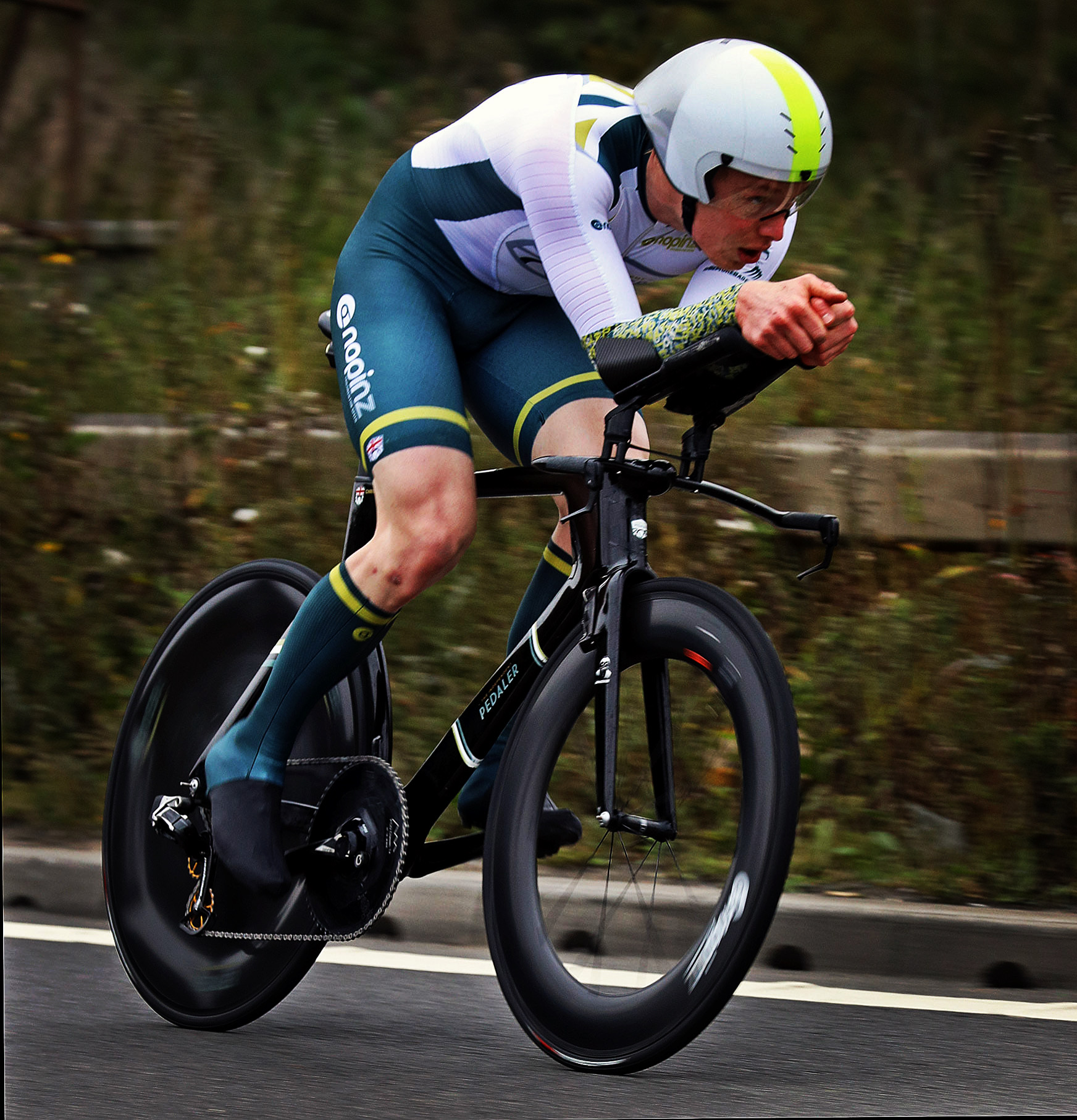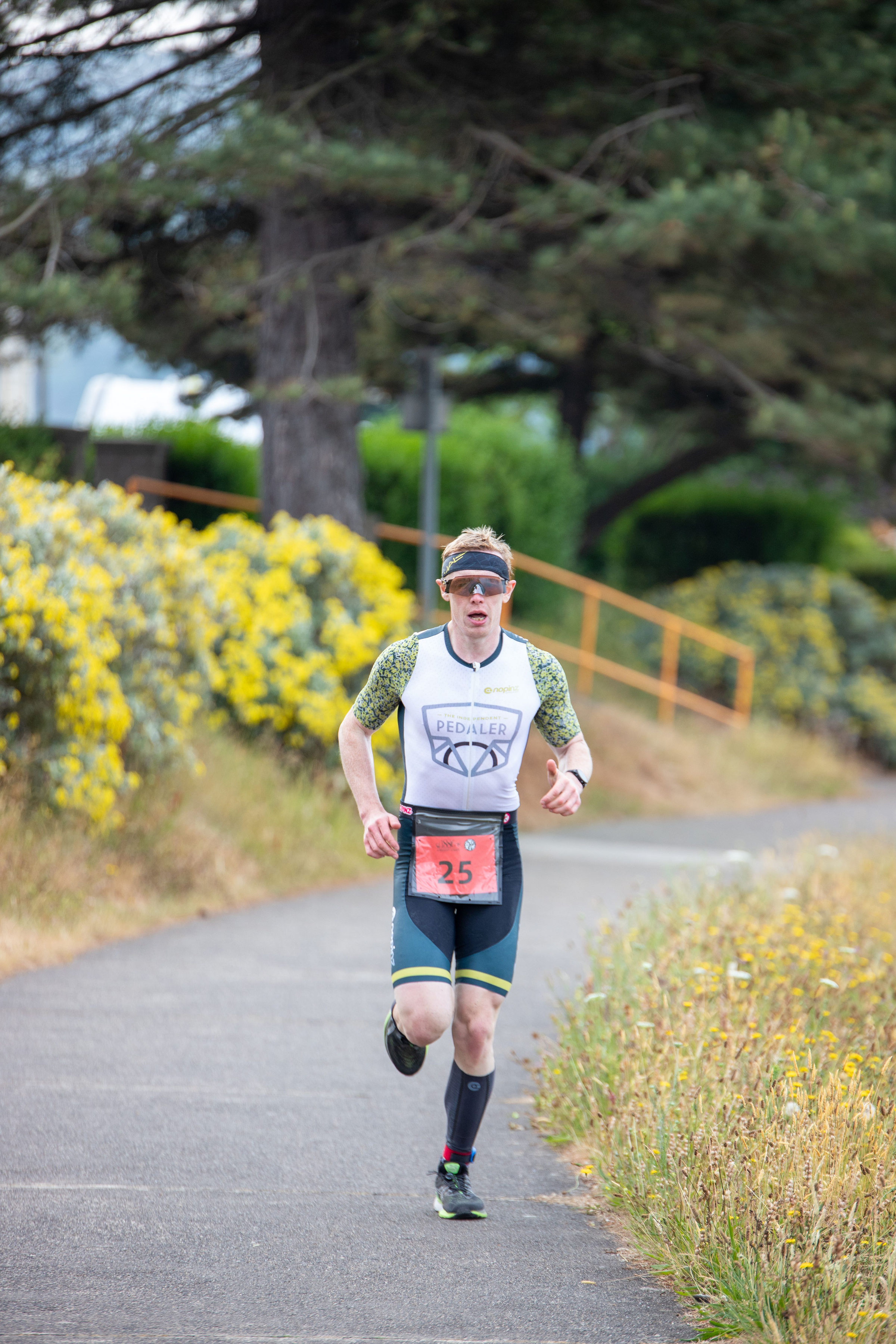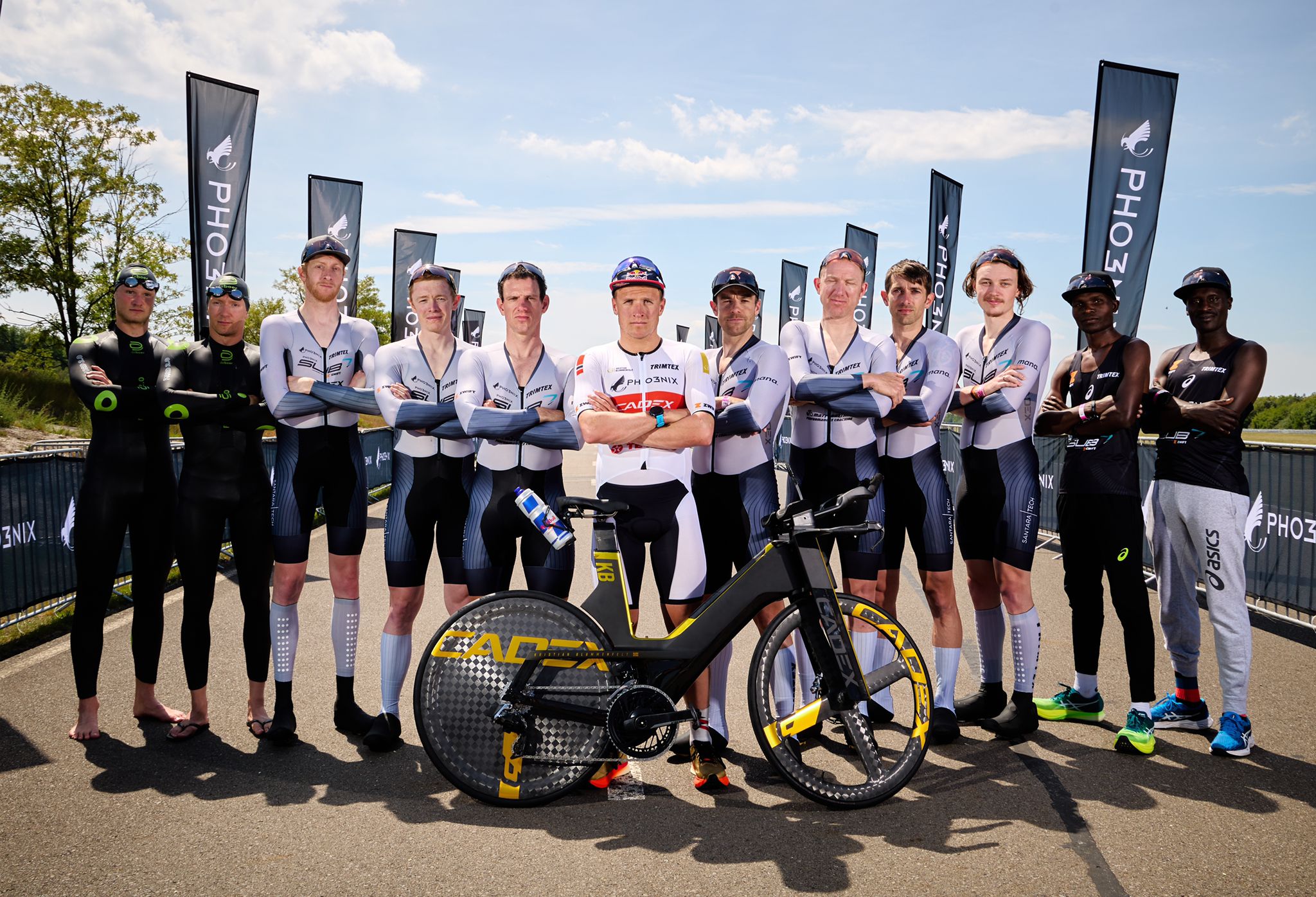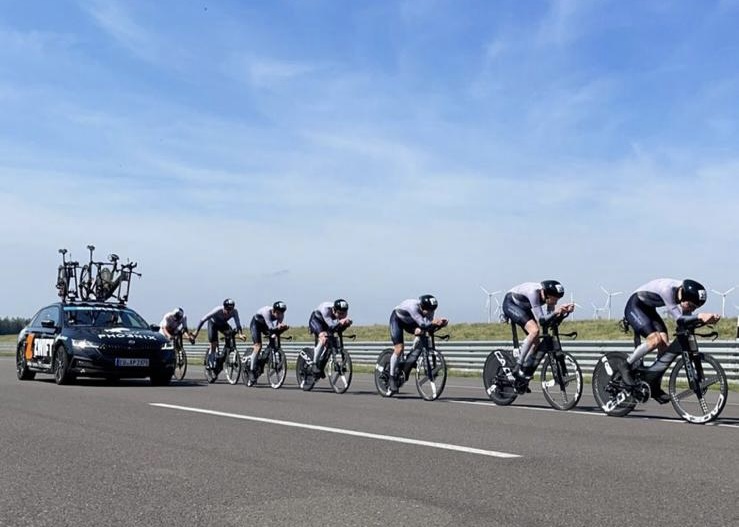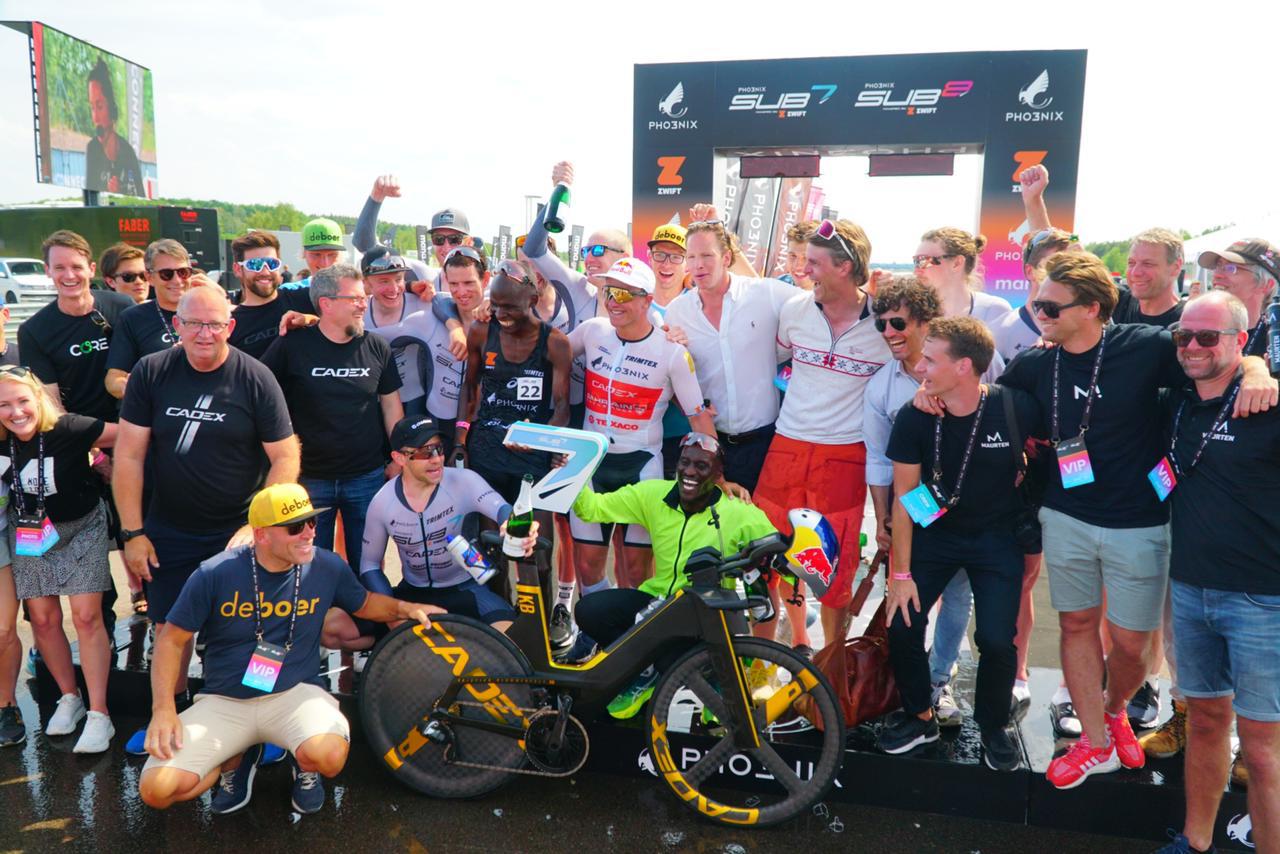Chris Fennell is a current University of Kent student and Sports Scholar for Cycling. We caught up recently with Chris as he approaches his PhD thesis in August 2024.
Can you talk us through your academic journey at Kent, detailing when you started at UG through to completing your PhD this summer?
Between 2015 and 2018 I completed an UG in Sport & Exercise Science at Kent. I then completed an MRes in Sport & Exercise Science between Sept 2018 and Aug 2019. I had planned to complete a PhD soon after the MRes, but delayed this due to COVID. I took on a research assistant role at Kent during COVID. Then from Sept 2021 I have been undertaking a PhD at Kent, again in the School of Sport and Exercise Sciences. My planned PhD thesis submission is in August 2024.
Can you provide a summary of the some of the research projects you have been involved in at Kent as well as the subject of your PhD thesis this year?
My PhD is focused on investigating the effect of ageing on the complexity (nonlinear behaviour) of physiological signals. My final PhD study investigated the neural control mechanisms underpinning lower extremity muscle control and the complexity of muscle torque.
Throughout my time at Kent away from my PhD, I have completed research projects investigating: the effect of cycling positions on gross-efficiency, the optimisation of training prescription for cyclists, the nonlinear dynamics of ECG signals, the effect of age on NIRS-derived mitochondrial oxidative capacity, and whether tramadol is a performance enhancing drug.
You studied on the Medway Campus initially before the School of Sport and Exercise Science (SSES) moved to Canterbury, can you comment on your experience at both Campuses and the recent investment in facilities the SSES has made at Canterbury?
Although, I enjoyed my time studying at the Medway campus. The move of the school to the Canterbury campus was very welcomed. As you say, being on the Canterbury campus has led to investment in new facilities. I believe being on the Canterbury campus, with the new facilities and equipment will attract many more students. Moreover, there is added potential for the school to work with and support the sports teams, who are based on the Canterbury campus.
As a child you said that you didn’t have much interest in playing or competing in sport, was there anything in particular that put you off engaging and when did you first notice your innate competitiveness?
Yes, I was never interested in the typical team sports (e.g., football, rugby etc) that you are most exposed to at secondary school. Although, this is most likely because I was just not very good at these sports. It was really by chance I came across cycling in 2011 and realised I was actually okay at endurance sport. From then I took the usual route of doing local races, through to regional and then to national racing. I never really thought I would end up being competitive nationally. But probably because I stuck at it long enough, and by sheer will I managed to be reasonably successful at a national level.
You started competitive cycling relatively late (age 16), can you tell us what sparked your interest in Cycling (Lands’ End to John ‘O’ Groats) and when you started to compete more seriously?
I started cycling recreationally in 2011 at 15 years old. Then in 2012, I simply decided I wanted to cycle Lands End to John O Groats before my 17th So I completed the End to End ride in 8 days raising money for the Help for Heroes charity. Then between 2013 and 2015 I took time before heading back to university *(I dropped out of Royal Holloway University in 2013, where I was studying History) to work and race bikes more seriously. In those years, for a number of reasons, I decided I wanted to go back to University. From 2015, I carried on racing as a “serious hobby”.
As an academic interested in research and data, was there a kinship for you with cycling and the huge focus it has on performance data and the marginal gains era propelled by Team Sky?
To a certain extent, cycling is a data and research driven sport, so it did play a role in my interest. To be competitive in cycling you need to understand the data and keep up to date with the advances sport science. That said, in the latter years, I used cycling as an escape from my academic work and wasn’t so obsessed with the scientific aspect of my own cycling. Although, I do use the science to inform the work I do with other athletes.
Can you provide a brief timeline of your first cycle competition and how you progressed from Road Cycling into the specifics of Time Trialling where you achieved your best results?
From memory, my first cycling competition would have been a local club time trial in 2012. In the 2013, 2014, and 2015 seasons I did competitive road racing, but this discipline of racing wasn’t for me. I enjoyed the purity of the time trial; the individual race from A to B as fast as possible. So from the 2016 season I focused specifically on Time Trialling. It turned out I was reasonably good at racing against the clock, and with great support from sponsors I continued racing until 2022.
You competed frequently on the road between 2019 and 2022 winning 11 National Titles – could you comment on your top two performances or proudest moments on the bike during this period? (Wales & Cambridge)
Yes, as can be seen by my timeline it took me a long time to win my first national championship race, which happened in 2019. The race seasons from 2019 to 2022 were very good to me and I had my best performances. Of course, personally there were many other notable performances for different reasons. However, the first stand out performance was the 2021 National 100 mile Time Trial Championship, held on a challenging course in Wales. This ended up being my first National 100 mile Championship win, in a time on 3 hours 18 minutes 18 seconds (approx. 31mph average).
It wasn’t the win that I remember the event for, but just feeling at one with the bike and surprised at the pace I was managing to hold. I produced my best power numbers for a 3 hours effort (358 Watts) and was able to race to the finish line without dropping power.
The second stand out performance, was just a regional 25 mile race. This was a fast course, but I did not have any expectations in terms of time. In short, I completed the race in 44 minutes 10 seconds (34mph average speed), which is still my personal best for the distance and I believe still the 2nd fastest 25 mile time nationally. The performance stands out in my recollection of how effortless it felt, what some would term a float day. Also, it can sometimes feel fun to go pretty fast on a bike under your own power, even if it really hurts at the time.
Cycling has grown significantly in the UK over the last decade following Bradley Wiggins’ Tour de France win and the success of British Cycling on the Track, how difficult is it to progress and compete at this level and can you comment on some of the support you received locally to help you progress in this sport?
Cycling has grown in the UK from the 2008 and 2012 Olympics and the ensuing success of British cyclists throughout the 2010s. Professional cycling internationally is extremely competitive, from the perspective of winning races and simply making it onto a top professional team. For a British rider to make it professionally, you need to live and race abroad. Unless you go through the British cycling track programme, you are unlikely to make it internationally by racing for a UK domestic team.
My experience is solely from a domestic level of competition, as I never had ambitions of pursuing a professional cycling career after 2014. However, the domestic time trial scene is still extremely competitive and everyone is continuously pushing the boundaries of performance to be competitive. So much so that there is often a trickle up of technology and ideas from the British Time Trial scene to the World Tour cycling teams.
During my most successful Time Trial racing seasons (2018 to 2022) I was supported by The Independent Pedaler. Who essentially made it possible for me to compete. Providing support with bikes, equipment, kit, travel etc. I owe a lot of my success and opportunities to them. As well as the financial support, we worked a lot on the psychology of preparation and execution of races. Which probably contributed most to the success I had.
Can you comment on how expensive it is now for a young cyclist to make progress in the sport with the rising cost of cycling equipment as well as the challenges and costs they face having to travel to competitions both nationally and internationally?
In the current time trial era, most competitive time trialist racing setup could cost circa £20k. But the cost is limitless, and if money was no option, you could easily spend in excess of £100k on Time Trial equipment. However, I should say, spending money doesn’t instantly make you competitive on race day, you can win with a setup of £1k.
Unfortunately, it is not a cheap sport if your goal is to be competitive nationally or internationally. There are initiatives and opportunities for people to access the sport. Money doesn’t buy talent, but it does buy the best kit, the best support, and sometimes buys access to teams…! The reality is like many things, you need money if you want to compete.
We cannot talk about professional cycling and not mention drugs. With the dark history and ongoing scrutiny all professional and amateur cyclists face, can you comment on your time as a competitive cyclist and the inevitable doping cloud that followed your sport?
It is important to discuss drugs in cycling, and in all sports. I do believe the sport is cleaner now, with the rigorous testing of professional athletes. However, I would be naive to say the sport was completely free from drugs. There is always going to be speculation and doubt surrounding cycling, given its past, particularly when performances appear anomalous! Despite the potential doubt, we have to believe what we are seeing now is clean, until proven otherwise. It is not good for the sport or athletes to live in the past.
Whilst we are on the subject of drugs – I believe you are currently hoping to do some research in this field with your SSES colleagues ahead of the Olympics in Paris this year. Can you update us on this project?
I was a researcher on the WADA funded project in SSES that investigated the performance enhancing effects of Tramadol on cycling performance. This research was used by WADA to inform their decision to add Tramadol to the prohibited list in 2024. The PI on this project was Professor Lex Mauger. While I cannot comment further on furture research projects. There are new and stronger analgesics potentially replacing tramadol in sport, not yet banned by WADA. Research will need to be undertaken into the effects of these drugs on the performance and health of athletes.
Whilst professional cycling in the UK has grown significantly with great international success, however on the contrary, the state of UK roads and many people’s diss-passion for cyclists leaves us well behind our European counterparts – what are your thoughts on domestic cycling provision and what would you say about it to the current Transport Secretary over coffee?
Yes, UK roads are in a dire state. This affects all road users, but particularly the safety of cyclists. I am generalising, as there are many good roads for cycling and training. However, in recent years I have felt unsafe out on the roads more often. I can see this as barrier to many wanting to take up cycling, which is unfortunate. We can only hope resources will be provided to improve the state of the roads for all users.
Having focused so long on Cycling you have now moved over to Triathlon and Iron Man competitions – what initiated this transition and how have you nurtured your obvious talent in cycling to swimming and running?
Having focussed on cycling for 12 years I needed a change and a new challenge. I still have the desire to compete, and as a demanding endurance sport, triathlon seemed the logical new challenge. The years of cycling have provided me with a solid endurance base, which has provided a good starting point for my attempted move into Ironman racing.
Indeed, swimming and running have their own demands. As such, it will take time to develop the techniques and put together a strong swim-bike-run race. Nevertheless, I am motivated by a new challenge and look forward to seeing what I can do in the sport.
You were involved as a pacer for the Joe Skipper Vs Kristian Blummenfelt Head-to-Head record breaking race in 2022 – how did this opportunity come about, what doors did it open for you and how did it feel to be part of a ‘Team’ success having competed individually for so long?
In short, Matt Bottrill (Triathlon/Cycling Coach and many times national champion) was contacted to put together a pacing team for Kristian Blummenfelt for the Sub7/Sub8 Ironman attempt. Similar principle to the Nike Sub2 marathon, but instead the attempt was to go under 7 hours for an Ironman distance triathlon (several great Sub7Sub8 documentaries can be found on Youtube).
Matt essentially put together a bunch of British Time Trial riders, to form the pacing team for the cycling discipline in the Ironman event. I was lucky enough to be asked to be one of the 8 pacers.
We had a couple of training camps with the team and Kristian. Essentially to practice the pacing line to provide Kristian with the easiest and fastest 112 mile ride, before running a 2 hour 30 minute marathon. Being part of a team supporting another athlete to achieve a greater goal was an extremely rewarding experience. Perhaps in some respects more rewarding than racing for my own success.
Overall, it was a pretty awesome experience, which allowed me to spend time and train with arguably the “best” triathlete at this time.
Norway has a proud history in many sports and consistent success at the Winter Olympics (for obvious reasons) but also some special athletes who will be seeking gold this summer in Paris (Warholm, Ingebrigtsen(s)), can you enlighten us from your time working with Kristian and his Norwegian Team how such a small nation has developed so many world-beaters recently?
From my limited time with Kristian and his team, it was the extreme focus on the details, but also paying attention to doing the simple things right. Everyone wants marginal gains, but very few even get the simplest things correct, thus the battle is already lost. They embody the meaning of professionalism and commit everything to being the best in their sport.
What are your immediate, medium, and long term goals in Triathlon/Ironman and what does your training schedule currently look like?
At the moment my ambition is simply to see how far I can take my Ironman racing. I have no history with the sport and therefore no expectations, which is nice. It would of course be amazing to take it professionally, but let’s not get too far ahead.
Training is reasonably simple. Swim, bike, run, and a good few hours of gym work. Currently, I am doing about 22 to 26 hours a week, but sometimes more depending on time and fatigue. The typical weekday (Mon – Fri) will be 90 minutes in the pool (AM), 60 minutes in the gym (Lunch), 60-90 minutes run (PM). Weekends (Sat & Sun) will be 2 to 4 hour bike and a 2 hour run both days.
I am not an expert in preparation for Ironman racing, but I know you need to do the long hours and build a robust platform from which to compete. There are no short cuts and you have to embrace the process.
Bringing the discussion right back to your time at University as a Kent Sports Scholar, how did the Scheme support you to continue cycling and competing whilst studying?
The scholar scheme enabled me to continue my cycling throughout my undergraduate studies. The support provided by the programme is invaluable to any aspiring athlete during their time at the University.
Can you comment on how the Sports Scholarship Strength and Conditioning programme and having access to the coaches (one of which is now your colleague at SSES) improved your performance whilst at University?
The scholarship S&C sessions were my first experience of incorporating strength work into my training programme. The sessions provided me with the techniques and confidence to complete gym sessions, which complemented my on-bike training. I strongly believe all endurance athletes require some aspect of S&C in their training programmes, to improve performance, but also reduce the occurrence of injury.
Graduating students face many challenges and those with a sporting passion often find it challenging to continue alongside the distractions of work and life but can you comment on how you’ve continue to focus on cycling/triathlon and continued to compete whilst also progress academically?
Absolutely, it is very challenging and different for each individual depending on their situation. Personally, the academic path I have taken over recent years (i.e., PhD) has provided me with the flexibility and time to fit the hours of training.
What advice would you give to an aspiring Sports Scholar applicant looking to come to Kent to study or to a current Scholar exploring post-grad opportunities at Kent?
Know you can commit to being an athlete and achieving academically at the same time. If you are determined and focused, university provides sufficient time to balance training and academic studies.
Your Cycling Team’s Mantra of “No Excuses – Own Your Outcomes’ will certainly resonate with a lot of our current Sports Scholars, what do you enjoy most about training and how do you stay motivated to continue to train?
As an athlete, during training and competition, there are many things in your control and many things out of your control. It is the same for everyone and when it comes to the competition there can only be one winner.
Generally, you lose more often than you win, for reasons in and out of your control. Making excuses regardless of the reason is not beneficial and doesn’t change anything, you still lost! Own it, learn from it, and move forward.
Probably, like most people, I enjoy the feeling of improvement and progressing towards executing a performance in a target competition. For me, day-to-day training is very automated and requires minimal motivation. Although, this is likely driven by longer term motivations to be optimally prepared for the next competition.
Finally, you are being inducted into the Kent Sports Scholars ‘Hall of Fame’, can you provide a final soundbite about what sport means to you and how it can positively influence everyone’s life?
Firstly, it is an honour to be inducted into the Hall of Fame. Not something I expected, so thank you. For me, sport is an escape and a positive way to channel energy. Sport as we all know has plentiful benefits for physical and psychological health. While in a chaotic and changing world, sport can be a positive constant for many.

